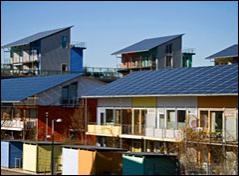Fannie Mae and Freddie Mac have essentially shut down an innovative program that helps Americans green their homes. Here’s more on the story:
Jeanine Cotter, CEO of California solar installation company Luminalt, has a good explanation of what keeps homeowners from investing in rooftop solar and retrofits that cut energy waste. In her experience, people trust the technology. They’re eager for improvements that will save them money on monthly bills. The real barrier is the credit shortage caused by the mortgage crisis.
“The biggest impediment is upfront cost,” she said in an interview. “It used to be that people were concerned that the technology wouldn’t work. Now that Wal-Mart, Macy’s, and Safeway have solar arrays on their roofs, people have a lot of confidence in the technology. And they trust that over time they will get a more than adequate return on their investment.
“But for homeowners and contractors, the regular credit markets are not as robust, to speak mildly, as they once were. Credit is tight for small businesses. Credit is tight for people trying to get equity out of their homes. So all of the traditional ways that people would be able to make home improvements aren’t available anymore.”
That’s why Property Assessed Clean Energy (PACE) is so useful. By using government credit to borrow money from the private sector, the financing tool gives homeowners access to much-needed credit. By tacking the cost of improvements onto property tax bills, it spreads out payments over time, letting them keep pace with electricity bill savings.
This is also why it stings so much that Fannie Mae and Freddie Mac prohibited the nation’s first PACE programs in letters to lenders (see Fannie’s [PDF] and Freddie’s [PDF]).
When Cisco DeVries, the Berkeley mayor’s chief of staff, designed PACE three years ago, it was a local-government innovation that offered what private finance markets hadn’t: a workable loan product for home-energy projects. Now two corporations from the finance industry are undermining the local solution.




